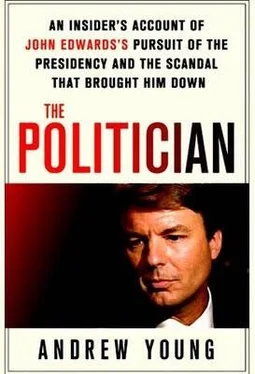On the day Cheri and I were engaged, the United States Senate acquitted President Clinton in his impeachment trial, ending thirteen months of crisis over his sexual affair with Monica Lewinsky and his stupid, lying attempt to escape the truth. Senator Edwards played a role in the investigation, helping to preside over depositions of Lewinsky and Clinton ’s friend Vernon Jordan. He also made his first speech to the full Senate during the closed-door impeachment trial, which was one of those rare moments when all one hundred members actually occupied the chamber. A lot of staff time and effort was put into preparing Edwards’s remarks, but when the time came he put away the text and spoke, as he said, “from the heart.” (He later authorized the release of a transcript of his remarks.)
In considering the charge, Edwards said, “I think this president has shown a remarkable disrespect for his office, for the moral dimensions of leadership, for his friends, for his wife, for his precious daughter. It is breathtaking to me the level to which that disrespect has risen.” But he did not agree with those who thought Clinton acted with a criminal’s intent to avoid prosecution. Instead, he saw a politician’s instincts at work: “I suspect the first thing he thought about is, ‘I’m going to protect myself politically.’ He was worried about his family finding out. He was worried about the rest of the staff finding out. He was worried about the press finding out.”
Urging the Senate to focus on the question of whether the evidence against Clinton exceeded the standard of “reasonable doubt,” Edwards said he had poured long hours into studying the case, often staying up till three in the morning. In the end, although he suspected Clinton might be guilty of “a lot that has not been proven,” he couldn’t join those who thought the president had committed perjury or obstructed justice.
Considering John Edwards’s gift for courtroom drama, I’m certain he held the Senate’s attention with his explanation for his votes against the charges. But once I read the speech and thought about the clubby culture of the Senate, I realized that he probably won them over at the end, when he talked about how he had come to admire, respect, and even love his colleagues.
“An extraordinary thing has happened to me in the last thirty days,” he told the one hundred senators. “I have watched you struggle, every one of you. I have watched you come to this podium. I have listened to what you have had to say. I talked to you informally; I watched you suffer. I believe in my heart that every single one of you wants to do the right thing. The result of that for me is a gift. And that gift is that I now have a boundless faith in you.”
Edwards told me that after his address, he was practically bowled over by colleagues who wanted to congratulate him. Senator Edward “Ted” Kennedy, one of the great old lions, even wandered to the back of the chamber, where the newest members of the Senate were given their desks, to shake his hand. Kennedy saw almost unlimited potential in this young, energetic, well-spoken, and good-looking Southerner who shared his position on most issues. All the other freshmen in Edwards’s class were veteran politic822teran pians who could be seen as part of the “system” that needed fixing. At a time when the public was sick of partisan politics and business as usual, this “outsider” status made him even more attractive.
Of course, you didn’t need to be a Kennedy to see something in John Edwards. All you needed was a subscription to Capital Style magazine, which put him alone on the cover of its February issue with the cover line building the perfect senator. The article, titled “Senator Perfect,” presented Edwards as an almost accidental politician. The author noted that Edwards had failed to vote in six different elections and couldn’t recall if he registered first as a Republican or a Democrat, but also argued that this inexperience was balanced by Edwards’s many obvious gifts. Quoting the political analyst Stuart Rothenberg, the magazine said of Edwards, “He may well be Clinton without the baggage. That’s what we’re watch-ing and waiting to find out.” At a time when the Republicans and Karl Rove looked unstoppable, the Democrats needed someone like John Edwards. This is why Time called him “The Democrats’ New Golden Boy.” Senator Edwards loved all the attention but was also wary of it. “Andrew,” he told me, “they just build you up so they can tear you down.”
Washington seemed to love Edwards, and from the beginning he attracted attention from the kingmakers in his party. But he was still burdened with the ordinary chores that come with joining the world’s most exclusive club. He had to get up to speed for his committees-Small Business; Health, Education, Labor, and Pensions; Intelligence; and Judiciary-and hire staff for his Washington office on the second floor of the Dirksen Senate Office Building and for outposts around the state. To keep in touch with his constituents, he began holding weekly events called Tar Heel Tuesdays, which were open to the public. In D.C., he gave key jobs to his top campaign aides, Josh and Julianna, and then hired dozens more. In North Carolina, he tapped a mix of political pros and old friends and neighbors.
I first asked for a job with Edwards on the day after the election, but as time passed I started to worry that his staff was overwhelmed with applicants and might overlook me. I didn’t have a strong personal connection to the senator, but Wade Byrd, Edwards’s friend and top donor, had told me to call him if I ever needed help. I drove down Interstate 40 to I-95 South and found the stately Victorian house where he kept his offices. He brought me into his private study, sat behind his desk, and talked about his friend “Johnny” Edwards and how he’d helped plot his candidacy. At the end of our talk, he promised to call Johnny on my behalf. He followed through, and in July I joined the Edwards team in Raleigh.
We worked out of space on the third floor of the historic Century Post Office, which was the first federal building constructed in North Carolina after the Civil War. Mr. and Mrs. Edwards picked the building for its architectural character and because it was some distance from where North Carolina ’s other senator, archconservative Jesse Helms, kept his office. Equipped with used federal chairs and desks (I found old Helms papers in mine), the placudine), the was furnished in a drab government style except for the personal items people added to the décor. I put up a framed tourism poster from the 1930s that showed the U.S. Capitol and declared, “Your National Capital Beckons You.” Some of the people in the office worked every day on constituent issues like passports and Social Security concerns. My job involved working with state and local governments and helping citizens with complicated issues.
Everything you can imagine flows through a senator’s local office, from immigration appeals to reports about unidentified flying objects. One lady left rambling messages about her sexual fantasies-all of them involved Senator Edwards-on the office answering machine every night. Agents of the Office of the U.S. Marshal eventually paid a visit to her trailer and asked her to stop making these calls. She didn’t. We heard almost as often from a federal inmate who wrote the senator on ten-foot stretches of toilet paper. Every sheet was filled with his carefully penciled grievances about the government. Each time one of these communiqués arrived, I got a kick out of watching an intern try to use an official stamp to record receipt of the letter without tearing it.
Most of the real business I did required me to steer questions to the right federal agency or untangle red tape. People who had seen campaign ads saying that Senator Edwards was going to Washington to use his trial lawyer experience to be an advocate for the little people called to seek clemency for relatives on death row. I did a lot of listening and a lot of sympathizing but could offer them very little concrete assistance.
Читать дальше











